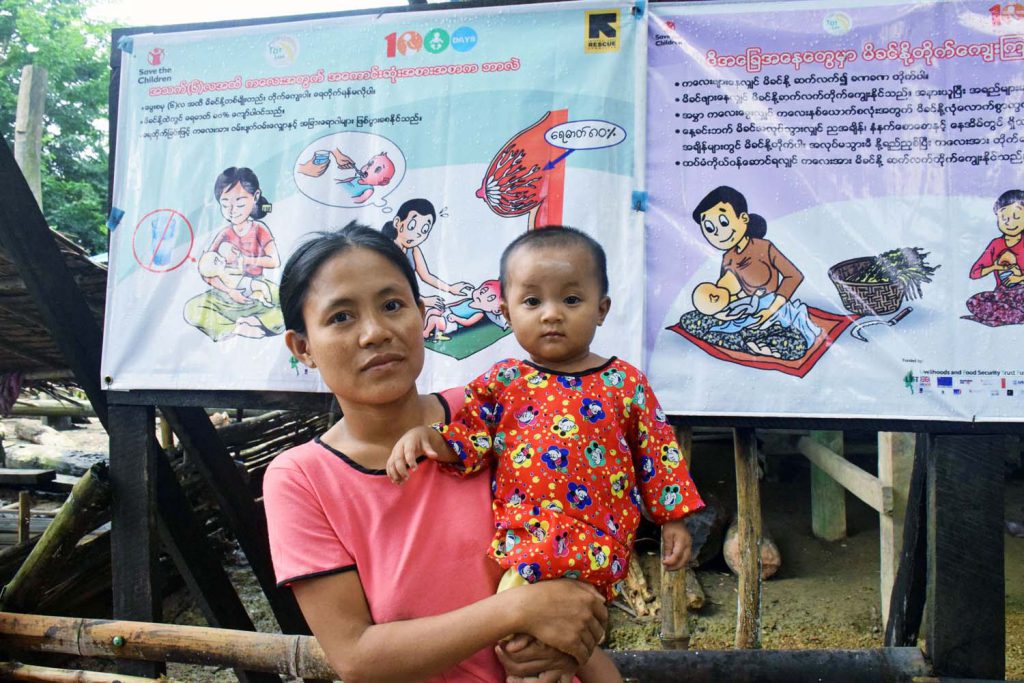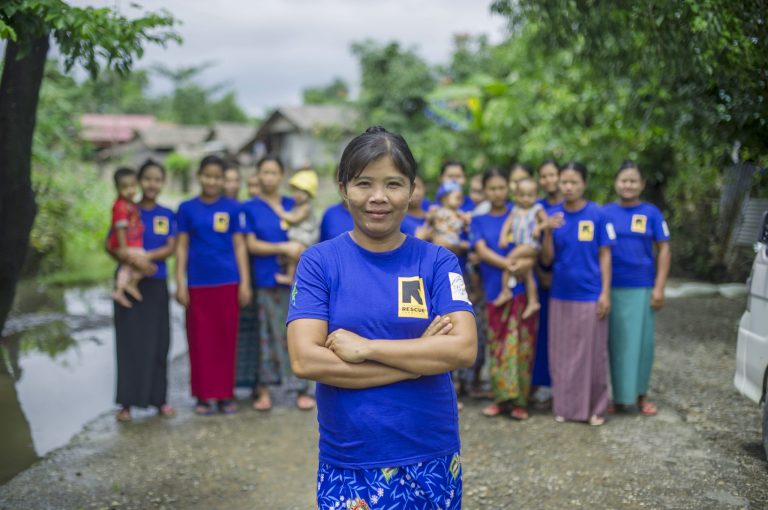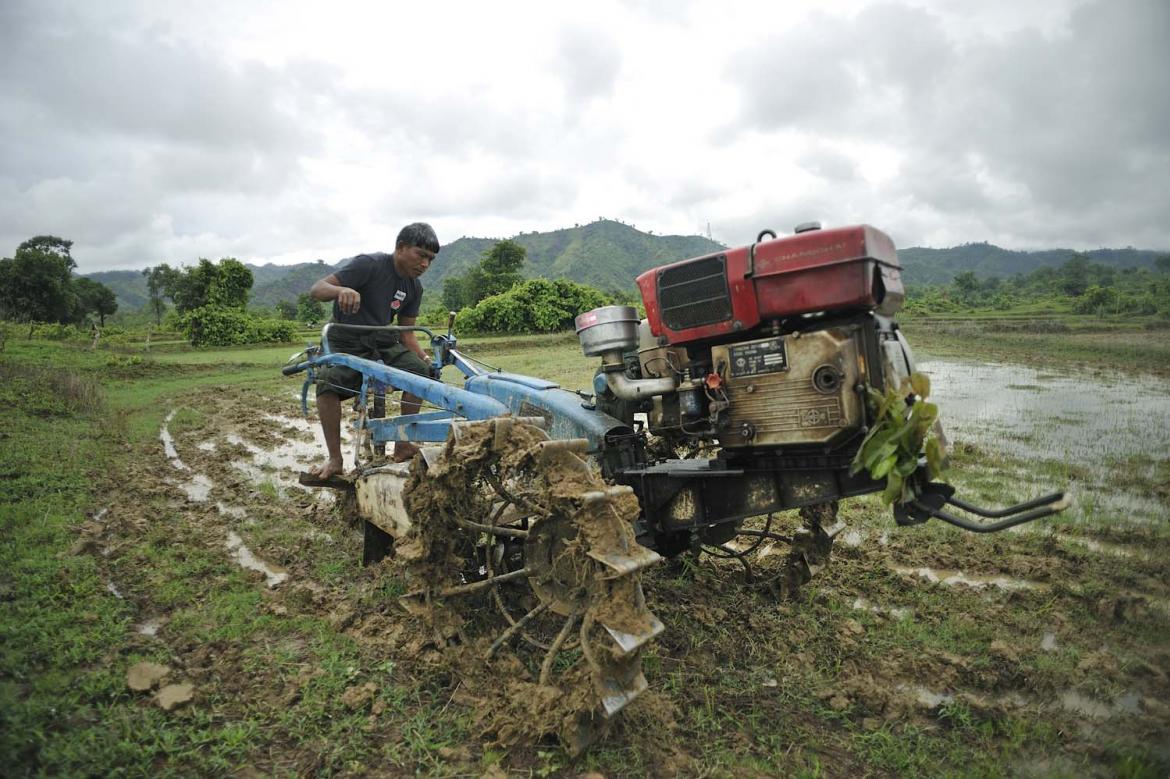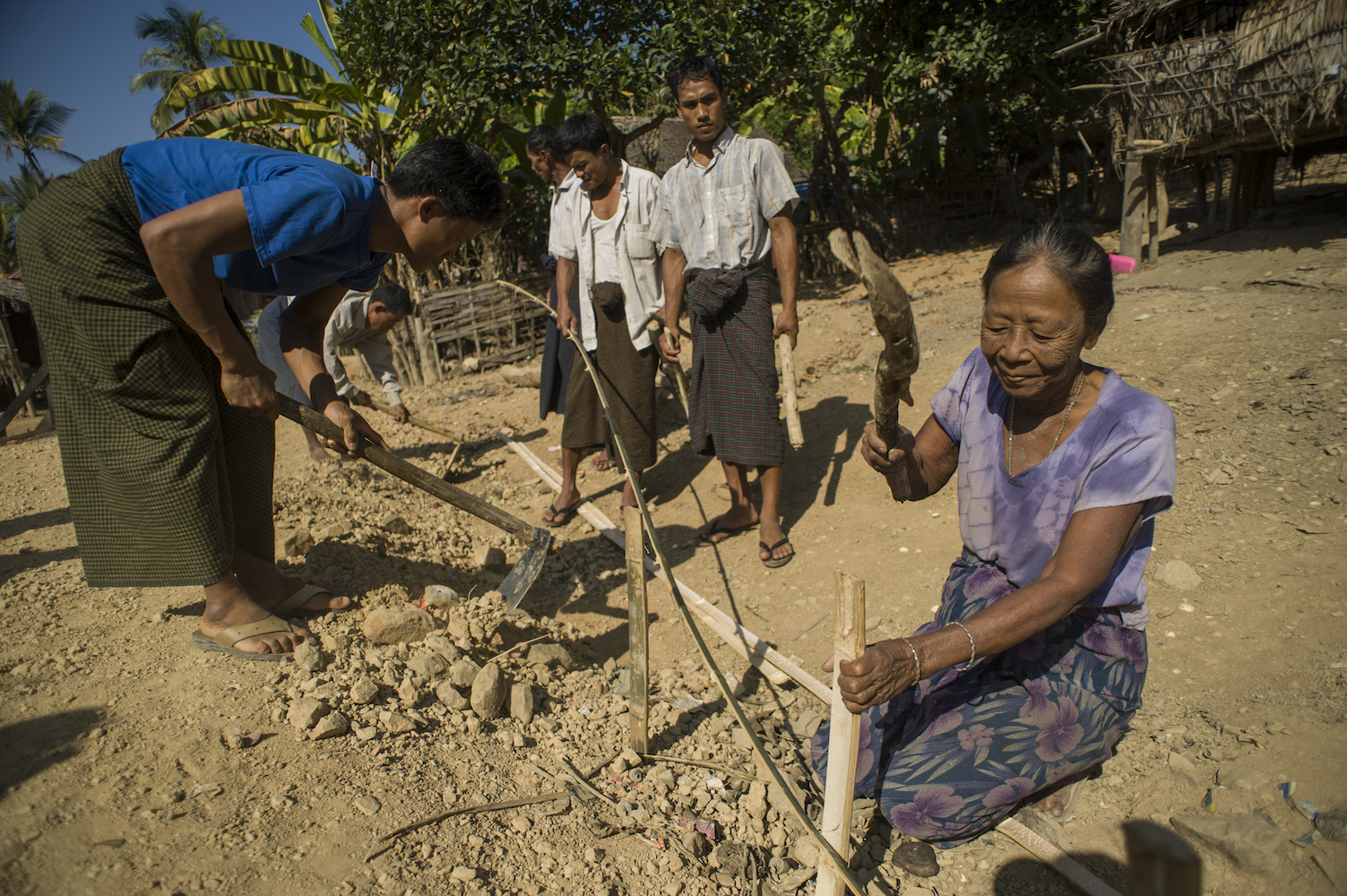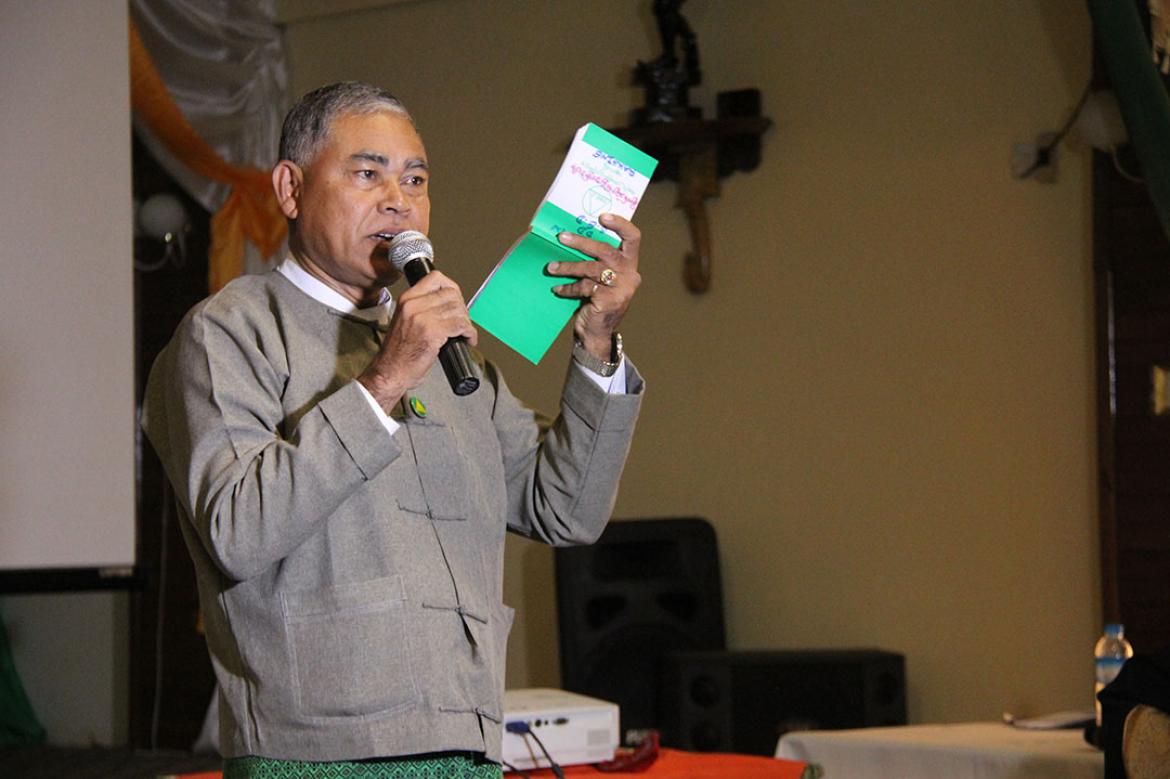This article was produced and sponsored by the Tat Lan programme.
An infant feeding initiative that started with cash payments to pregnant women and new mothers in just 30 central Rakhine State villages in 2014 has been influential in encouraging the government to roll out a similar programme across parts of Myanmar.
By MARGARITE CLAREY and MOH MOH THAW | TAT LAN
MA NYO NYO TUN knows how important a nutritious diet is for the growth and development of a child, both during pregnancy and in the first years of life. Yet, like many mothers from poorer households in rural Rakhine State, she long struggled to put this knowledge into practice. With just the income from a small grocery shop in Minbya Township’s Yin Chaung village to support her husband and three children, her family often has to cut costs on meals in order to make ends meet.
This is relatively common in Myanmar, where a joint assessment on living conditions in 2015 revealed that one-third of households limit their diet because of lack of money and 8 percent of families frequently run out of food. Under-nutrition in children below five years of age is among the highest within ASEAN, with the Ministry of Health and Sport’s 2015-16 demographic health survey finding 29 percent of children were stunted and 7 percent wasted. Children who are too short and thin for their age have a reduced capacity to think and retain information, which has irreversible effects on their physical and cognitive development.
Before the birth of her now eight-month-old-daughter, Nyo Nyo Tun registered to receive a maternal and child cash transfer. The Tat Lan programme provides pregnant women and mothers with a monthly payment of K15,000 (US$9.50) for the first 1,000 days of their baby’s life – from three months after conception until their second birthday – as these are considered the most critical for growth and development, and the most opportune time to prevent stunting.
With the extra cash, Nyo Nyo Tun was able to eat well throughout her pregnancy and six months of exclusive breastfeeding after the birth. “I felt a lot healthier than my previous pregnancies,” she says as she jiggles a plump baby called Hnin Akari Tun on her hip. “The money helped me a lot.” Now that Hnin Akari Tun is eating solids, Nyo Nyo Tun is careful to set aside the cash to buy nutritious foods for her. “I make sure that I only spend that money on my daughter.”
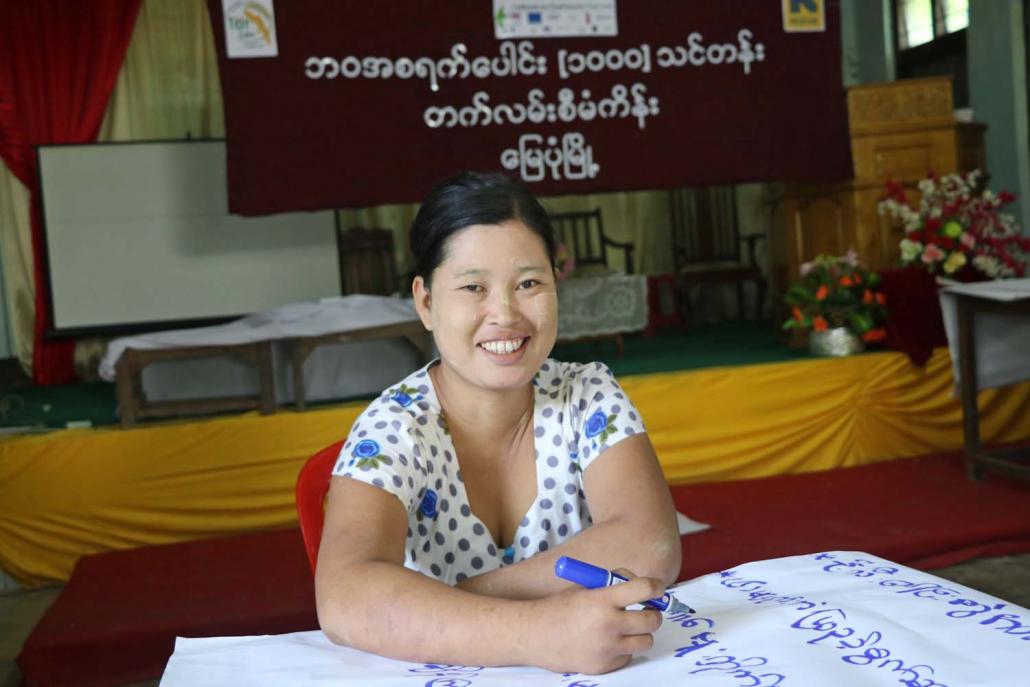
Tat Lan community nutrition volunteer Ma Thin Phyu Phyu Win notes down the barriers that mothers in her community face in exclusively breastfeeding their children during an advanced maternal nutrition training in Myebon in September. (Tat Lan)
Beginning with just 30 pilot villages in central Rakhine State in October 2014, Tat Lan’s infant feeding initiative was the first of its kind in Myanmar. Combining monthly cash payments with a nutrition awareness and behaviour change programme, the Livelihoods and Food Security Trust Fund-supported project has since provided means, knowledge and support for 11,440 mothers from Kyaukphyu, Minbya Myebon and Pauktaw townships to keep their children healthy and well-fed during the critical first thousand days of life.
With Rakhine State one of the most impoverished in Myanmar, this maternity cash payment can be a lifeline for new or expecting mothers. Ko Hla Thein Tun, the administrator of Alan Kyune village in Myebon Township, says the cash makes a big difference for mothers and children in his community. “Most mothers are poor and have to manage their income very carefully to cover the family’s essentials. This makes it hard for them to prioritise their young children,” he says.
In December, Tat Lan will hand over its Rakhine Maternal and Child Cash Transfer (MCCT) project to the Department of Social Welfare (DSW) as part of a government roll-out set to replicate the successful Tat Lan MCCT model in select areas across the country.
“While we invest in physical infrastructure to build up the country, we also need to invest in our human capital,” says U Kyaw Linn Htin, director of the Social Protection Section at DSW. “The best time to invest in our people is in their infancy – from pregnancy until their second birthday – and how we do that is through nutrition.”
The government-managed programme began in Chin State, Naga Self-Administered Zone and Rakhine State during the 2017-18 fiscal year and was extended to pregnant women in Kayin and Kayah states on October 1. Plans are being set for pregnant women in Shan State and the Ayeyarwady Region to begin receiving the benefit from the 2019-20 fiscal year, says Kyaw Linn Htin, who confirms that the maternity payment is open to all, regardless of their socioeconomic standing.
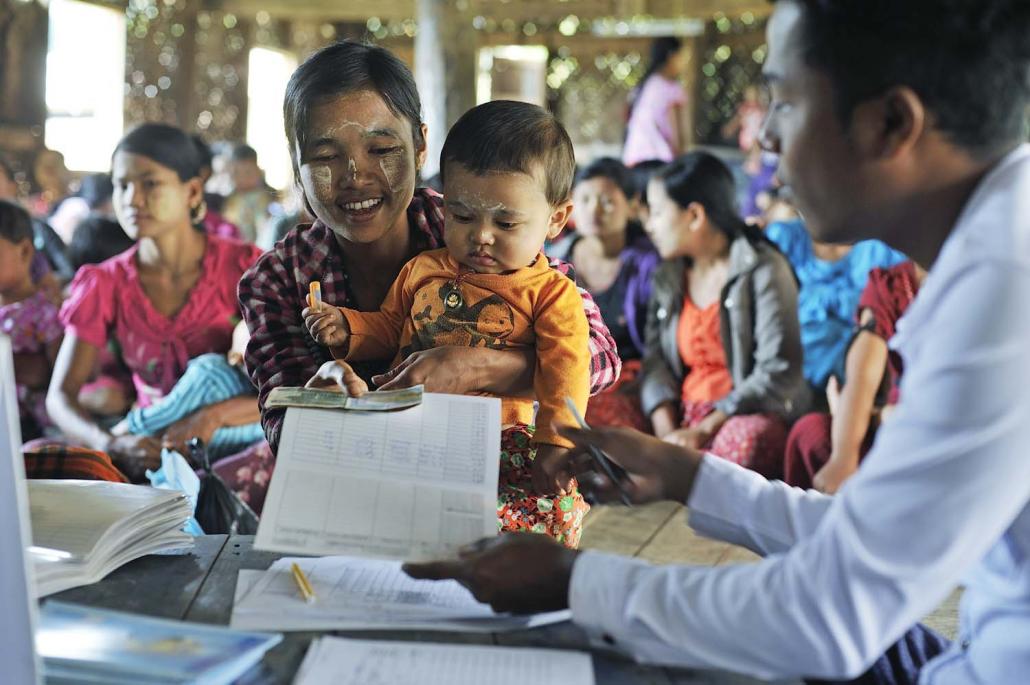
A mother collects her maternal and child cash transfer payment from Tat Lan staff in Yoe Sa Nwin village during a mother-to-mother support group meeting. (Kaung Htet | Tat Lan)
The government rollout comes from momentum gained by the decision to include maternity cash transfers as a flagship programme in the Myanmar National Social Protection Strategic Plan, which was released just two months after Save the Children launched Tat Lan’s pilot in 2014.
Mr Nicolas Guillaud, Save the Children’s food security and livelihoods adviser, says the Tat Lan MCCT project showcased the viability of distributing cash alongside nutrition behaviour change sessions at a time when child nutrition was high on the agenda of donors and the government.
Officials were able to visit MCCT villages to see the programme in action, which built confidence that the money would reach the women, that with the right knowledge they would spend it on nutrition and health, and that the injection of cash wouldn’t distort local markets, says Guillaud.
“The fact that the MCCTs were going on while the plans were being set by the government meant that we could speak from our experience and say that operationally speaking it is feasible,” he says.
Getting the cash to pregnant women and mothers has not been without difficulties, as has ensuring they receive it frequently enough and with the right messages to spend it on healthy foods. In remote Rakhine villages, many of which are only accessible boat, Tat Lan staff and village volunteers do the monthly hand-outs in person during maternal nutrition awareness sessions. When the payments come before nutrition training or are given in larger lump sums to fit around rough weather conditions or public holidays, women say they struggle to plan ahead and pocket enough money for healthy meals.
“If the cash is spent for other purposes, our mission won’t be successful,” says U Kyaw Hla Sein, township health assistant 1 at the Department of Health in Myebon, who tries to get out to rural communities as often as possible. A lack of human resources, however, has meant the social behavioral change components of the government programme have been stalled. “We have to explain to mothers how important nutrition is for a family. We try to educate so we can change their practices. That is our responsibility,” says Kyaw Hla Sein.
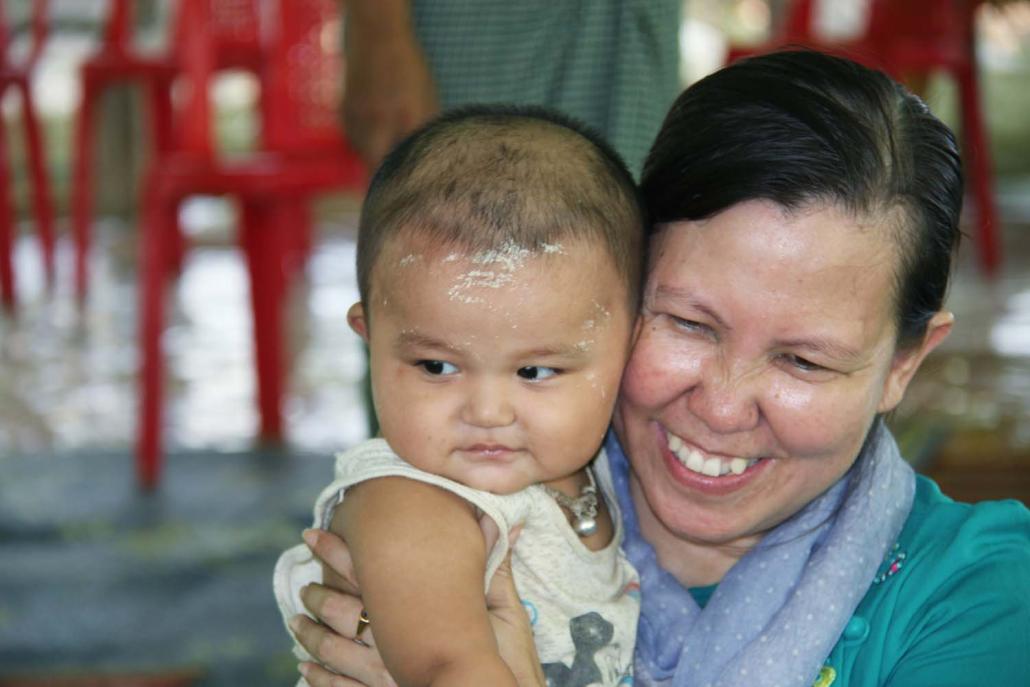
Dr San San Aye (pictured), then acting director general of the Department of Social Welfare, visited Tat Lan villages in May 2017 in the lead up to the government rollout of the maternal cash transfer programme. (Kaung Htet | Tat Lan)
As the rollout of cash transfers accelerates under government management, Tat Lan is working to ensure that nutrition education keeps pace in central Rakhine State. In Myebon, Minbya and Pauktaw townships, community nutrition volunteers are being trained to provide the face-to-face mentorship that mothers may otherwise miss out on.
“I do home visits to mothers to discuss their difficulties,” says Ma Thin Phyu Phyu Win, a community nutrition volunteer from Myaing Thar Yar village who attended an advanced “First 1,000 Days” training on exclusive breastfeeding in Myebon in September. The workshop included practical modules on effective latch positions for breastfeeding and how to express and store breast milk. These challenges aside, Thin Phyu Phyu Win says that community elders pose the biggest barrier to exclusive breastfeeding and maternal nutrition.
“If I discuss exclusive breastfeeding with the mothers they listen but it is hard for them to follow things that are different from their traditional practices,” says Thin Phyu Phyu Win, “especially when their own mothers tell them to feed their infant babies or give them water when it is hot outside.”
When Tat Lan expanded the MCCT project to rural villages in Myebon and Minbya townships in 2016, nutrition manager U Aung Han Win was shocked by the low levels of nutrition knowledge and unhealthy practices stemming from food myths and taboos in Rakhine.
“These challenges are much more difficult to overcome. We have to change the community’s beliefs on nutrition, which are often completely wrong,” he says. In Rakhine State, he adds, mothers often forgo food in the seven days after giving birth and avoid feeding their infants colostrum or first milk, which is highly nutritious, and full of antibodies that ward infants against disease. Driven by fear, these practices are directed by elders whose fierce convictions come from having lost their own babies to diarrhoea.
“I was not allowed to feed my first-born colostrum because the elders thought it would make my child sick,” says Ma Shwe Tin Thein from Yoe Sa Nwin village. “Instead I fed her milk powder mixed with sugar water but still she was often sick.” Shwe Tin Thein also followed her elders’ advice to cut watercress, pumpkin, tomatoes and fish without bones from her diet, leaving her weak and unable to produce enough breast milk.
To counter food myths that perpetuate stunting, the community nutrition volunteers lead mother-to-mother support groups where they pass on knowledge on exclusive breastfeeding, maternal care, nutrition and handwashing. The meetings, set to continue beyond December, provide parents with the opportunity to share tips on affordable and nutritious meals, discuss their worries, and rally together against pressure from their elders to continue infant feeding practices that contribute to malnutrition.
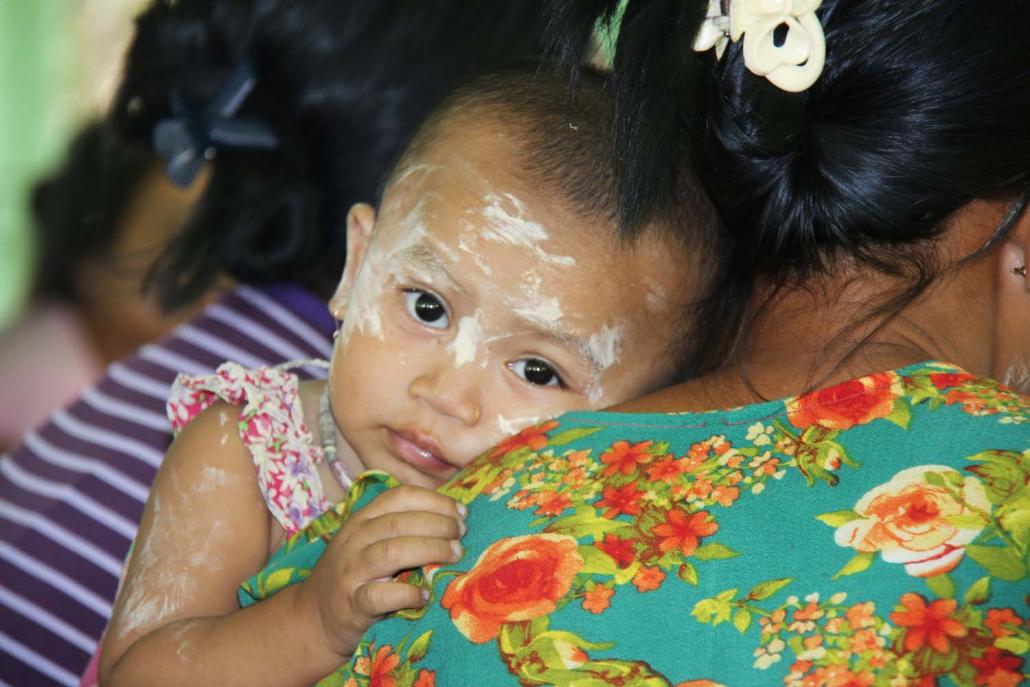
A child looks over her mother’s shoulder in Myint Gar Thit village, Pauktaw Township, during a meeting between Tat Lan MCCT recipients and the Department of Social Welfare. (Kaung Htet | Tat Lan)
Shwe Tin Thein attributes the health and curiosity of her second child, Mg Soe Thiha Kyaw, to the knowledge she gained from Tat Lan and the nutritious food she was able to eat while breastfeeding her baby. “[He] is already talking and is very interested in everything,” she says.
By the end of 2017, 65 percent of households in Tat Lan target areas demonstrated awareness of malnutrition and a nutritionally adequate diet for infants, up from 28 percent in 2015. For community nutrition volunteer Thin Phyu Phyu Win, this knowledge has brought noticeable changes in her village, where she says there are fewer cases of babies with jaundice or diarrhoea.
Guillaud says that evidence from across the country suggests that there have been significant improvements on infant and young-child feeding practices, as well as on key hygiene practices which also effect nutrition status. “We also know that most of the money is used on food and health costs, which is very positive,” he says, adding that Tat Lan’s final end-line assessment will determine the impact on stunting in central Rakhine State.
“Now when we go out to the Tat Lan villages, we see children who look healthy and well-nourished. This physical change we have seen with our own eyes,” agrees Tat Lan’s Aung Han Win.
Despite initial challenges, the rollout of the MCCT by the government is an important step towards increasing maternal nutrition and health awareness in Rakhine State and other parts of the country.
“Before it was not easy to get pregnant women to come to us,” says Kyaw Hla Sein. “With the cash incentive, they will come to see us the day after they find out they are pregnant. The advantage is that we can educate them about maternal health and they can find out and prepare for any complications to the pregnancy.”
For new or expecting mothers the maternal cash payment means they can put their nutrition knowledge into practice and avoid cutting costs on food to the detriment of their children’s development.
“I think that the children in my village are looking healthier and stronger,” says community nutrition volunteer Thin Phyu Phyu Win. “They have a sparkle in their eyes.”
This article was produced and sponsored by the Tat Lan programme.


